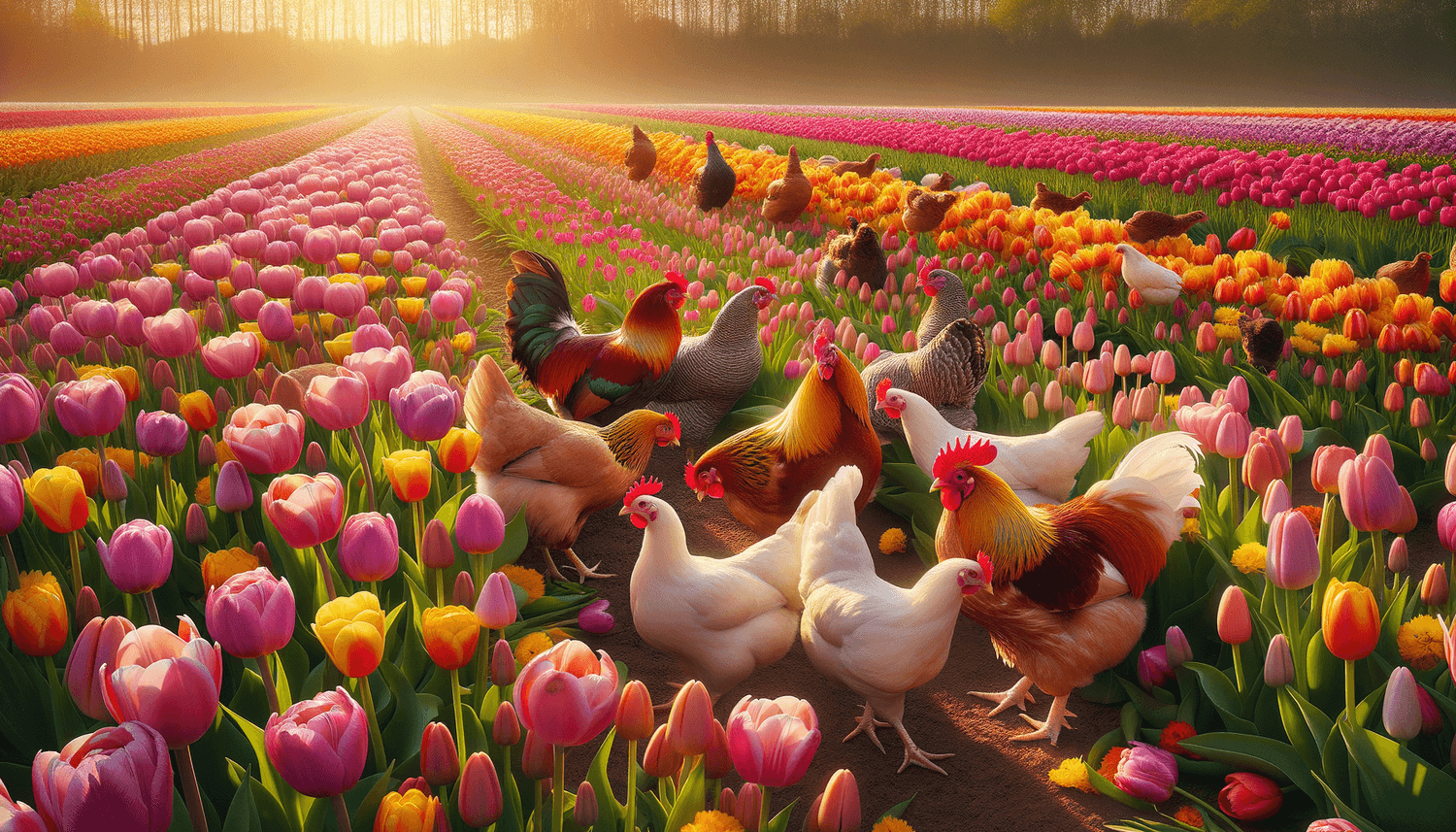Hey there, fellow chicken enthusiasts! Spring has sprung, and tulips are popping up everywhere – what a colorful treat for our eyes! But have you ever wondered, can these vibrant blossoms double as a tasty snack for our beloved backyard chickens? Fret not, for we shall dive deep into the world of tulips as potential chicken treats, exploring whether they’re suitable for consumption, their nutritional value, and how they fit into a balanced chicken diet. We’ll also give you the lowdown on any potential risks and tips to prepare these flowers for your feathered friends. So, buckle up and let’s get cracking on this petal-popping adventure! 🌷
Can chickens eat tulips?
No, chickens should not eat tulips as they can be harmful to their health. Tulips contain compounds called glycosides, which are toxic to chickens and can cause gastrointestinal problems and other health issues. To ensure your chickens remain healthy and safe, it’s best to avoid feeding them tulips or any part of the tulip plant.
A balanced diet for our clucking companions
Just like us humans, chickens need a balanced diet, too! A chicken’s diet should primarily consist of a high-quality chicken feed, which should make up approximately 80-90% of their daily intake. This chicken feed is specifically designed to nourish our feathered friends with the right balance of protein, vitamins, minerals, and other essential nutrients they need to stay healthy, happy, and productive.
Now, you might think that diets can’t be all work and no play, and you’re absolutely right! Chickens can enjoy a wide variety of tasty treats to brighten up their day and add some excitement to their regular chicken feed. The remaining 10-20% of their diet can include various fruits, vegetables, and other goodies. These treats not only add some yummy variety to their daily meals but can also provide valuable nutrients, vitamins, and minerals that contribute to your chickens’ overall well-being. Just remember to always provide treats in moderation, ensuring that their primary nutrition source stays at the core of their diet.
Nutritional value of tulips for chickens.
Though tulips may seem like an appealing treat due to their vibrancy and abundance in the spring season, they should not be fed to chickens. The primary reason is that tulips contain compounds called glycosides which are toxic to chickens. These compounds can cause health issues and gastrointestinal problems, making them an unsuitable addition to your chickens’ diet.
As tulips are harmful to chickens, their potential nutritional value becomes irrelevant in this case. It’s essential to prioritize the health and well-being of your chickens, which means avoiding plants or substances that can cause harm or illness. While chickens can benefit from a variety of fruits and vegetables as treats, it’s important to remember that not all plants are safe for consumption. Thus, it’s vital to research and consult reliable sources before introducing any new treat or food item to your chickens’ diet.
Nutrition table of tulips for chickens.
| Information | Description |
|---|---|
| Nutritional Value | Not applicable, as tulips are toxic to chickens |
| Suggested Serving Size | Do not feed tulips to chickens, as they are harmful |
| Safe Feeding Practices | Avoid feeding tulips to chickens due to toxicity |
| Preparation | No preparation needed, as tulips should not be fed to chickens |
| Potential Risks | Gastrointestinal problems and other health issues due to glycoside compounds |
| Hydration | Not applicable, as tulips should not be fed to chickens |
| Digestion | Not applicable, as tulips should not be fed to chickens |
| Seasonal Availability | In the spring, tulips are widely available, but refrain from feeding them to chickens |
| Other Benefits | Not applicable, as tulips should not be fed to chickens |
Safe alternatives to tulips for chickens
Though tulips are not a suitable treat due to their potential to harm your chickens, there are plenty of other safe, nutritious options to offer your flock. Vegetables like spinach, kale, cucumbers, tomatoes, and pumpkin are rich in essential nutrients and well-loved by chickens. You can also provide fruits such as apples, berries, or melons as treats, but keep in mind that it is necessary to remove any seeds or pits before feeding them to your chickens.
Aside from fruits and vegetables, there are other delicious and healthy treats you can offer your feathered friends. Chickens enjoy snacks like cooked pasta, scrambled eggs, mealworms, sunflower seeds, and even yogurt. Moderation is key, as it’s crucial to maintain a balanced diet for your chickens, with the majority of their nutrition coming from high-quality chicken feed.
Keep an eye out for toxic plants in your backyard
It’s essential to monitor the plants growing in your backyard or roaming area for your chickens to ensure their safety. Chickens are curious creatures, and they may nibble on unfamiliar plants out of curiosity. Along with tulips, there are other potentially toxic plants to watch out for, such as foxglove, daffodils, and rhubarb leaves.
If you are unsure about the safety of a particular plant, consult reliable sources or consult with a trusted veterinarian before allowing your chickens to access them. Ensuring that your chickens’ roaming area is free of toxic plants is an important step in maintaining their overall health and well-being.
Monitor your chickens’ health
While you provide a balanced diet and a healthy environment for your chickens, it’s also important to observe their health regularly. Monitor for any signs of illness, such as lethargy, loss of appetite, or changes in egg production. If you suspect that your chicken has consumed a toxic plant, like tulips, contact your veterinarian immediately for advice and action you should take.
By keeping a watchful eye on your flock, providing a balanced diet, and ensuring a safe environment for your chickens, you’ll be keeping your clucking companions happy, healthy, and productive!

















